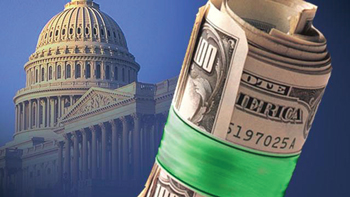Dark money in politics threatens Black interests
By Freddie Allen NNPA Senior Washington Correspondent | Last updated: Sep 23, 2015 - 9:23:05 AMWhat's your opinion on this article?

|
“Between 2007 and 2012, 200 of America’s most politically active corporations spent a combined $5.8 billion on federal lobbying and campaign contributions. [But] what they gave pales compared to what those same corporations got: $4.4 trillion in federal business and support,” the report said.
When the United States Supreme Court ruled that the First Amendment protections prevented the government from limiting nonprofits from making independent political contributions in the 2010 decision in Citizens United v. Federal Election Commission, voting rights advocates predicted a sea change in spending on elections.
The Demos report said that since the ruling, dark money flooded into the system and in 2016 it’s only predicted to get worse.
Dark money is generally defined as funds given to nonprofit organizations to influence elections without the group disclosing the sources of the funding.
The report said that political donations could influence lawmakers on a number of critical issues that have a significant impact on communities of color, including the minimum wage, paid sick leave and criminal justice reform.
“Secret corporate political spending threatens the integrity of our democratic self-government, as those with the deepest pockets can overwhelm other voices,” the report said. “This financial influence leads to the needs and wants of corporations being prioritized and can skew important public policy outcomes, often in ways that perpetuate racial inequities.”
The report noted that taxpayers foot the bill for government contractors who can then spend money on programs and lobbying efforts that do little to benefit people of color.
“Hundreds of billions of dollars in federal contracts, grants, loans, concession agreements, and property leases go to private companies that pay low wages, provide few benefits, and offer employees little opportunity to work their way into the middle class,” the report said and because people of color make up a disproportionate share of the low-wage workforce, they are directly impacted when companies argue against raising the minimum wage.
The biggest players in the for-profit prison industry also seem to benefit from their relationships with elected officials, but current regulations prevent the public from knowing the full extent of their political expenditures.
Citing research by the Center for Responsive Politics, the report said that Corrections Corporation of America, The GEO Group, Inc., and Management and Training Corporation spent $3.698 million on lobbying federal officials and the PACs and employees of these companies contributed $552,636 to federal campaigns in 2014.
“But this may only be a fraction of what these companies have filtered into the federal political system because it includes only those contributions that have been disclosed. There is no way of knowing how much money these companies have funneled into the political process through 501(c)(4) and (c)(6) organizations,” the report said. “The payout for CCA, GEO, and MTC’s efforts: in 2013 and 2014, these companies received over $1.561 billion in contracts from the federal government.”
Even though, Whites account for 62.2 percent of the U.S. population, more than 82 percent of Congress is White, the report said. Roughly 14 percent of the population identified as Black, but Blacks account for less than 9 percent of U.S. lawmakers on Capitol Hill.
Because companies are more likely to spend money to elect White candidates instead of minority candidates, underrepresentation of minorities in political offices, is sure to continue, despite shifting demographics.
The Demos brief recommended that President Barack Obama issue an executive order requiring federal contractors disclose political donations.
“This Order would be an important first step in bringing corporate political spending out of the dark and into the light,” to illuminate what candidates are in the pockets of big businesses with interests that diverge from those of the American public,” the report said, “and, in particular, people of color.”
INSIDE STORIES AND REVIEWS
-
-
About Harriett ... and the Negro Hollywood Road Show
By Rabiah Muhammad, Guest Columnist » Full Story -
Skepticism greets Jay-Z, NFL talk of inspiring change
By Bryan 18X Crawford and Richard B. Muhammad The Final Call Newspaper @TheFinalCall » Full Story -
The painful problem of Black girls and suicide
By Charlene Muhammad -National Correspondent- » Full Story -
Exploitation of Innocence - Report: Perceptions, policies hurting Black girls
By Charlene Muhammad -National Correspondent- » Full Story -
Big Ballin: Big ideas fuel a father’s Big Baller Brand and brash business sense
By Bryan Crawford -Contributing Writer- » Full Story






 Click Here Stay Connected!
Click Here Stay Connected!








